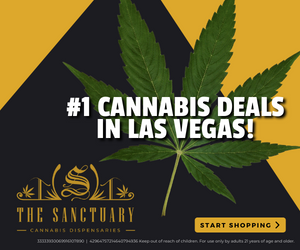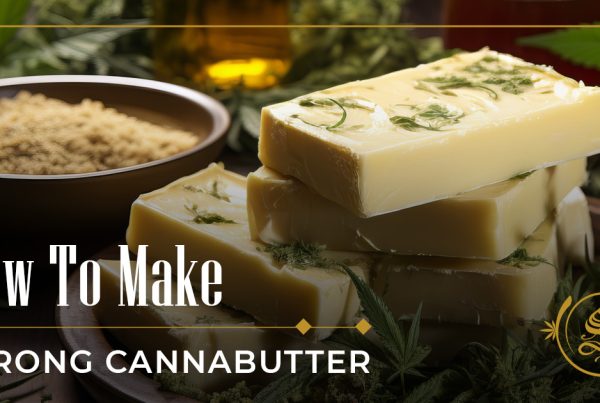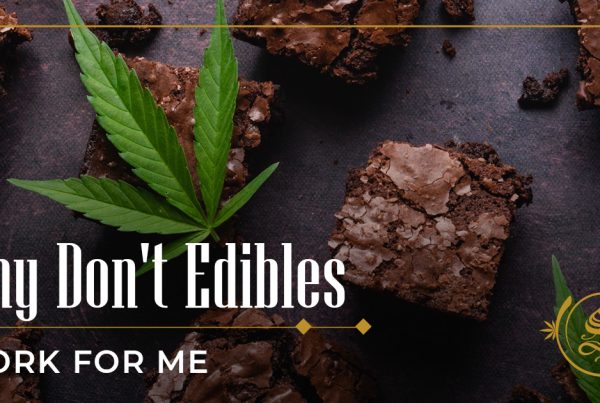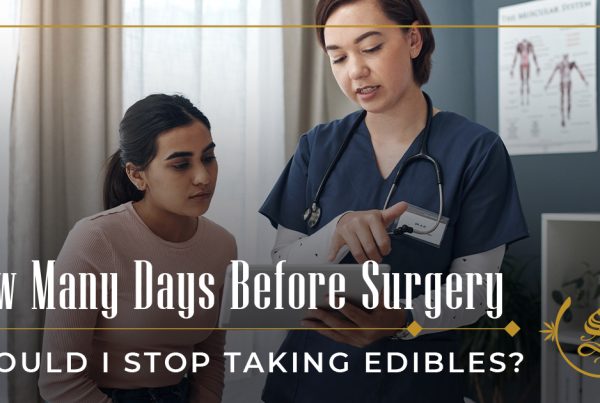Edibles are food products infused with cannabis. You can find them in many different forms with flavor profiles ranging from sweet to savory. Edibles are usually made with THC (delta-9-tetrahydrocannabinol) which is the psychoactive component in cannabis. However, they can also be made with CBD (cannabidiol) which will not get you high but can provide users with medical benefits.
Edibles are as synonymous to weed as smoking a joint. Many weed users prefer edibles over smoking because it is not as harsh on their lungs and it may even feel less taboo.
Eating edibles may be nearly as popular as smoking but that does not mean that they create the same effects. Being high on an edible is more intense and lasts much longer than the high you get from smoking flower.
Different types of edibles
Nearly every type of food product has been made in the form of a cannabis infusion. The weed market nowadays is so popular that manufacturing companies need to be one step ahead of their competitors in creating something new and exciting. Types of weed edibles you may find include:
- Baked goods: brownies, breads, cookies, and rice krispy treats.
- Candies: gummies, suckers, hard candy, chocolate, truffles, fruit bars, and marshmallows.
- Drinks: chocolate milk, coffee, tea, soda, energy drinks, and smoothies.
- Base products: butter, oils, sugar, and syrups.
Finding the right dosage
The potency of an edible is measured differently than cannabis flower or concentrate. Instead of stating the percentage of cannabinoid strength, the potency of an edible product is indicated by the milligrams of cannabinoids contained in the product.
An edible’s package will typically label the milligrams of THC and/or CBD per serving, along with the total milligrams in the entire package. For example, an entire chocolate bar may have 50 milligrams of THC. If the desired dose is 5 milligrams, the bar can be divided into 10 pieces of 5 milligrams each.
The average edible dose is 10-15 mg of THC. These doses are generally effective for a person who is used to cannabis and wants to feel the effects of the edible for a few hours.
A very high dose begins at about 20 mg of THC. Doses this high carry the risk of unwanted side effects from taking too much THC. However, some chronic users of THC may want to use an edible this potent to experience stronger or longer-lasting effects.
When do edibles kick in?
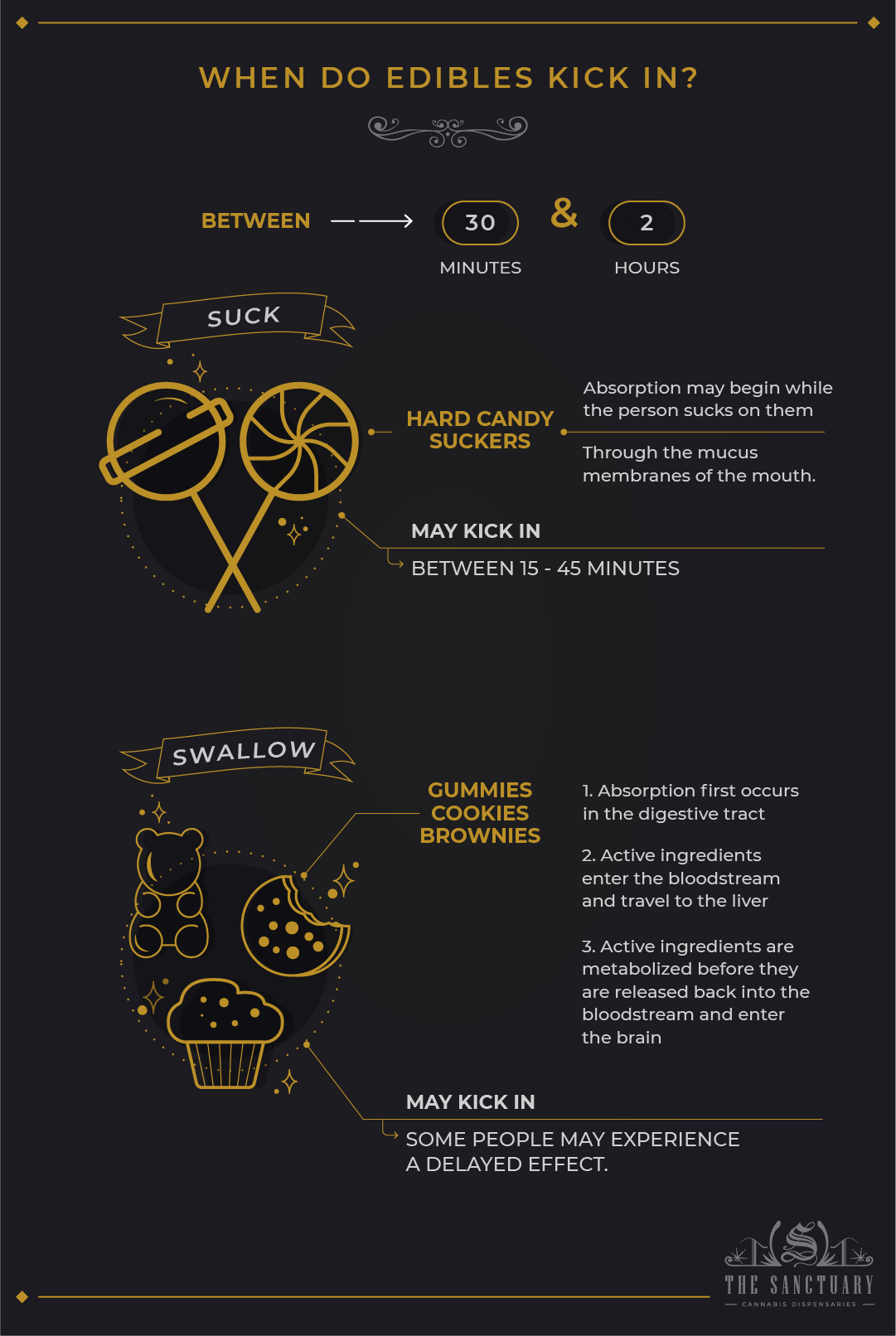
To say exactly when edibles are supposed to kick in is difficult. We first must look at the individual who is taking them. This is because there are many variables in one’s body chemistry that determine the effects of an edible. Those variables include:
- Age
- Weight
- Metabolism
- Diet
When ingesting an edible, the active ingredients in cannabis, like THC, need to travel through the digestive tract to reach the bloodstream. This is much more complex than the act of smoking which is mostly dependant on when the smoke travels to the lungs. The process of digesting an edible will take different times for each individual.
People with quicker metabolisms will feel edibles kick in faster. Eating edibles on an empty stomach will also play a major role, leading to faster onset times. If you eat an edible with other foods or after eating a large meal, it can take up to 2 hours for the edibles to become digested and kick in because your body now has more materials to break down.
Another major factor for determining an edible’s onset time is the type of cannabis product that you consume. For example, sublingual edibles like hard candies or suckers, begin to work while they are in the person’s mouth and therefore slight effects may begin within several minutes with the peak effects usually kicking in after 30-45 minutes. This happens because sublingual absorption occurs through the mucus membranes in the mouth.
Then there are edibles you swallow, like gummies, rice krispy treats, and brownies. These will take slightly longer to kick in. The absorption of cannabinoids does not occur until the edible hits the digestive tract. From there, the active cannabinoids enter the bloodstream and travel to the liver which is where the cannabinoids are metabolized. Then the metabolized cannabinoids travel back into the bloodstream and enter the brain, which is when the effects finally begin to kick in.
Edibles are much slower to produce effects than smoking or vaping weed which happen almost instantaneously.
People commonly may experience delayed results from edibles. They can go from feeling nothing to feeling a wave of highness crash into them at a moment’s notice. This can be quite intense for inexperienced users or even weed veterans. This is why it is very much recommended to wait at least 2-3 hours after eating an edible before you even think of eating more. Waiting will help you avoid the dreaded feeling of being way too high.
How long do edibles last?
Edibles not only take longer to kick in, but they also last much longer than if you were to just smoke. Eating a normal dose of an edible (roughly 10 milligrams) is expected to last for 6 or more hours. The peak effects should last you from the time it kicks in, to about hour 3, then users usually “settle in” to their high at that point and slowly climb into a state of relaxation or even sedation. However, you can also easily expect to be high for up to 8-12 hours depending on the strength of the edible and your overall tolerance to weed.
How long an edible lasts for you will vary greatly similar to the determinations of onset times. Varying factors such as metabolism, edible potency, and tolerance levels will determine how long you will feel the effects.
Depending on your tolerance level, the perception of an edible’s effects may be much different for you than say your friends even with the same dose. A person who is not used to edibles may experience the effects in a more profound manner. Even if you have experience with smoking, the high from an edible is truly unique.
Do edibles expire?
Just like regular food, edibles may have expiration dates. On top of the food having the potential to spoil, the cannabinoids in these foods will degrade over time. Most cannabis product manufacturers put labels on them so be sure to follow these expiration dates just like you would if they were not infused with weed.
Of course, edibles like gummies or hard candy should presumably never spoil but just lose its potency. Regardless of what product you have, consider storing your edible in a fridge or freezer if you intend to hold onto it for a while.
Too high from an edible?
Edibles can be deceptively strong. And sometimes people can make the mistake of not being patient enough to wait the 3 hours before taking more.
Taking in too much cannabis is not pleasant. Going over your limit can make you feel anxious, paranoid, nauseous, and just plain awful. So, what can you do when you need to sober up from too much cannabis? There are several ways you can counteract the effects of being too high. We have those methods thoroughly explained in our article: 11 Ways to Sober Up From Weed.


